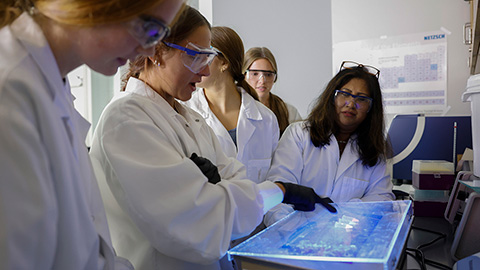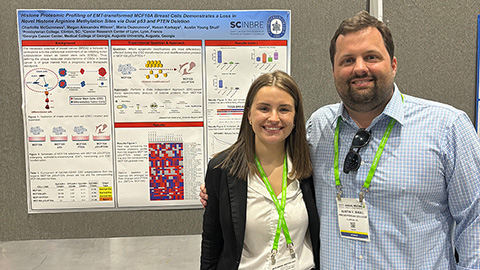Quarantined thoughts
We used to think science stopped for no one and nothing, but now that feels only partially true. During these uncertain times of mandated social distancing and a 24-hour COVID-19 news cycle, we’ve been reflecting on how different our lives are compared to four weeks ago.

her institution.
Back then, we were in the lab working diligently on finishing confirmatory PCRs for a large whole-genome sequencing study and organizing patient samples for another large study. Now, our days are filled with daily 9 a.m. lab meetings via Zoom, other conference calls (so many virtual platforms — and let’s be honest now, we all have a favorite), learning bioinformatics, and making loaf after loaf of fresh sourdough bread (yum).
As we do our best to navigate these unprecedented times, we remember the intimate idiosyncrasies of being a bench researcher and how much these are tied to our identities as scientists. Each researcher has a unique set of senses with which we perceive the fascinating world of bench science. Here are some sensory wet lab experiences that we’re missing during our mandatory telework days.
Sight
- We miss the fluorescent lighting of the lab, even though it usually causes us headaches after about four hours.
- We miss seeing other passionate scientists (AKA fellow nerds). Our political science major friends don’t share the same zest for neurological disease research wormholes.
- We miss the sight of the qPCR machine generating its multicolored curves in real time. Even when the experiment fails, it’s still pretty.
- We miss the way that our tube racks look when they’re finally organized and all oriented the same. exact. way.It takes dedication, but it is fulfilling.
- We miss the sight of the lab’s messy benches after a hard day’s work.

in her kitchen baking tasty treats.
Smell
- We miss the aroma the autoclave produces during its cycle, which is mysteriously similar to bread baking.
- Quite inexplicably, we miss the faint scent of mice coming from the behavioral testing room.
- We miss the smell of Trizol. Just kidding, no one ever smells Trizol because it is always used in a perfectly ventilated fume hood through which no odor escapes … And we don’t miss it.
- We miss the smell of the baked goods shared in the lunchroom by our wonderful lab mates. Another chance to smell baked bread.
- We miss the odor of rotten eggs and burnt rubber — oh wait, that’s just beta-mercaptoethanol being used outside the hood.
Touch
- We miss the cool benchtop on a warm day.
- We miss the weight of a pipet in our hands.
- We miss the weird feeling of hand sweat inside our non-latex gloves (not that much, though).
- We miss our itchy, too-warm lab coats.
- We miss holding hundreds of tubes as we attach adhesive labels to the lids. We suspect this fondness will be short-lived when we return to the lab.
Hearing
- We miss the sounds of our Maxwell extracting DNA from brain tissue (it’s just normal machine sounds for which the exact onomatopoeia is not yet coined).
- We miss the sound of the cell counter focusing. We don’t know why, but it’s such a specific, whirring sound that holds a special place in our hearts.
- We miss the sounds of scientists excited about successful experiments: gasps or general praise of science, cells, an antibody — whatever is involved.
- We miss hearing the freezer beeping madly to alert us that it’s gotten slightly too warm. Coincidentally, that sound also haunts our dreams.
- We miss the only sound in the lab at 2 a.m. — the hissing of liquid nitrogen tanks in the corridor. We only recently realized this wasn’t coming from lab ghosts.
Taste
- We miss the taste of the gummy bears that come with our primer orders from Eurofins.
- Beyond that, we’re hoping this one doesn’t apply to anyone these days since mouth-pipetting is strongly frowned upon.
Here’s to being able to do bench science again — soon.
Enjoy reading ASBMB Today?
Become a member to receive the print edition four times a year and the digital edition monthly.
Learn moreGet the latest from ASBMB Today
Enter your email address, and we’ll send you a weekly email with recent articles, interviews and more.
Latest in Opinions
Opinions highlights or most popular articles

The tortoise wins: How slowing down saved my Ph.D.
Graduate student Amy Bounds reflects on how slowing down in the lab not only improved her relationship with work but also made her a more productive scientist.

How pediatric cataracts shaped my scientific journey
Undergraduate student Grace Jones shares how she transformed her childhood cataract diagnosis into a scientific purpose. She explores how biochemistry can bring a clearer vision to others, and how personal history can shape discovery.

Debugging my code and teaching with ChatGPT
AI tools like ChatGPT have changed the way an assistant professor teaches and does research. But, he asserts that real growth still comes from struggle, and educators must help students use AI wisely — as scaffolds, not shortcuts.

AI in the lab: The power of smarter questions
An assistant professor discusses AI's evolution from a buzzword to a trusted research partner. It helps streamline reviews, troubleshoot code, save time and spark ideas, but its success relies on combining AI with expertise and critical thinking.

How AlphaFold transformed my classroom into a research lab
A high school science teacher reflects on how AI-integrated technologies help her students ponder realistic research questions with hands-on learning.

Writing with AI turns chaos into clarity
Associate professor shares how generative AI, used as a creative whiteboard, helps scientists refine ideas, structure complexity and sharpen clarity — transforming the messy process of discovery into compelling science writing.


